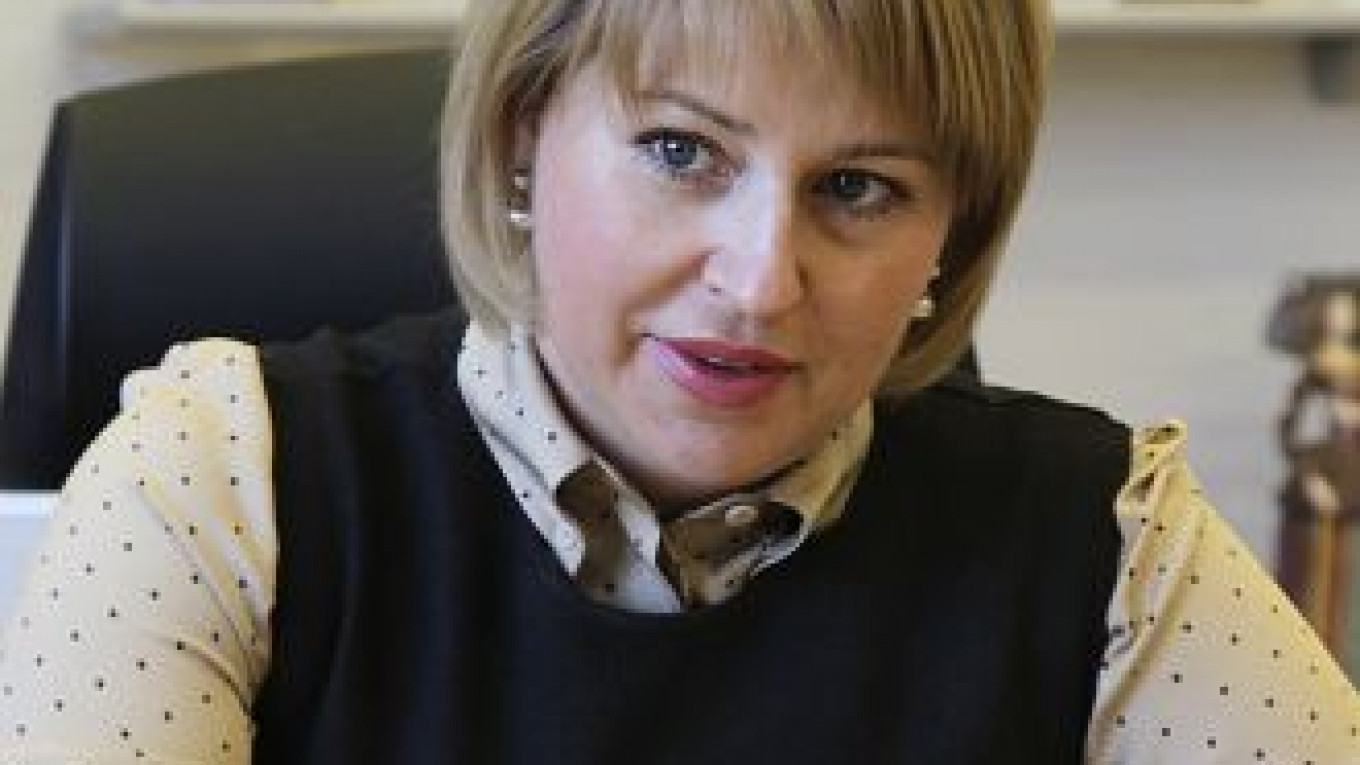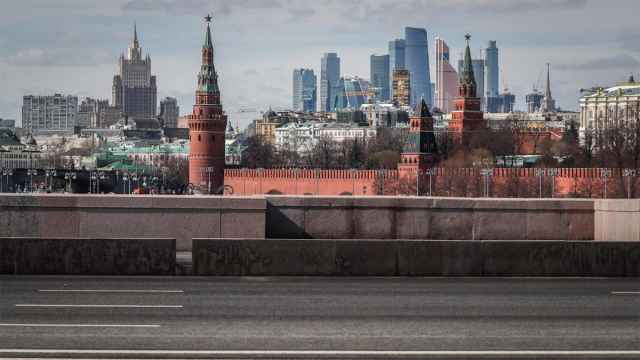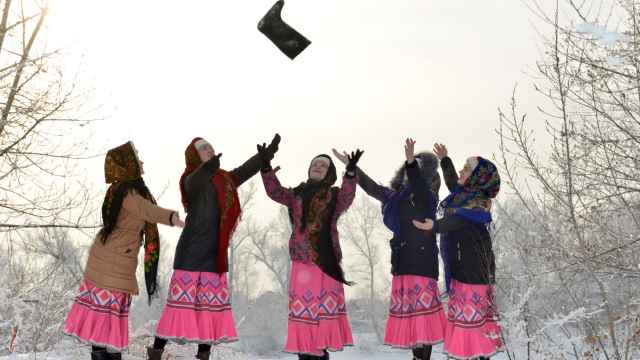The answer as to why Russians are so good at getting rich quickly came to Ksenia Ryasova, who started and runs the chain of Finn Flare clothing stores, as she peered out the window of a train departing from Helsinki.
Her Finnish partner Raimo Aaltonen, former owner of the Finn Flare trademark, who had posed the question, was standing on the platform wiping the sweat from his face and waving goodbye. He genuinely wanted to understand his customers' culture better.
Education
Incomplete higher education in municipal economics and management from the State University of Management
Work Experience
Early 1990s – Private entrepreneur
1997-2002 – President of Lyudi v Novom clothing stores
2006-Present – President of Finn Flare in Russia
Favorite book: “Gone With the Wind” (1936) by Margaret M. Mitchell
Movie pick: “Forrest Gump” (1994) directed by Robert Lee Zemeckis
Favorite Moscow restaurant: Ponton, Berezhkovskaya Naberezhnaya, in front of building 8
Weekend getaway destination: Diana hunting lodge in the Tver region
Ryasova and her Russian colleagues had been shopping when Aaltonen started calling her cell phone. He panicked that they might be late for the train, though their departure was still two hours away. He had already arrived at the station.
The Russians made it to the station with just enough time before departure for Aaltonen to run to the luggage room to get their suitcases and return to the train. He barely managed to get the pile of bags into their train car before it started moving.
As Ryasova watched her partner walk toward the exit, she realized she had the answer to his question and called his number.
"Raimo, remember you asked why we earn money faster than you, foreigners?" Ryasova asked.
"It's because we don't waste time. You saw we arrived at the station exactly before departure. It means every minute works for us. You foreigners do everything leisurely. This is the difference between us," she said.
Ryasova, 42, was born into a family of Soviet engineers. She spent three years in Vietnam with her husband in the early 1990s, and used her time there to explore the local manufacturing market.
After returning to Russia, she started buying clothes abroad for sale, then grew to design her own clothes and order their production at leading factories in Vietnam.
In 1996, she met Aaltonen in Germany, who at the time owned Finn Flare, which had been sold in the Soviet Union since 1974.
A year later Ryasova, by that time owner of a chain of multibrand clothing shops called Lyudi v Novom, or "People Dressed in New," started designing clothes to supplement Finn Flare's main collection that was being sold in Russia.
In 2002, Ryasova decided to dedicate all her time to exclusively branded Finn Flare shops and in 2006 became the head of Finn Flare in Russia. This year she made it into the top 100 most influential women in Russia, a rating compiled by Ekho Moskvy radio.
The experience gave her unique insight into what people like to wear and why. Her global travels gave her perspective on why some nations are poorly dressed and others not, and how competition for the attention of the dwindling male population is an essential element to female fashion in Russia.
This interview has been edited for length and clarity.
Q: What are your observations and advice about doing business in Russia?
A: The main thing is not to be afraid. Currently, our authorities are so worried that there will not be enough [foreign] investment that now the time is ripe to come to Russia. Today, you will see a green light where it was red before. It is more likely that officials will have policies that are too soft and will bow down before foreign investors.
In general, profitability is higher in Russia than in Europe. In developing countries, profitability is always higher —money is earned on risks.
Besides, our unions rarely go on strike. The unemployment level in Moscow is very low. Therefore people don't make a fuss when they get fired. This is a big plus.
In Spain, for instance, when someone gets fired, chances are low that they will find a job. In Moscow they will find a job tomorrow. This is both a plus and a minus. The minus is that it is not easy to find a candidate for the job and you have to invest in training your personnel.
There are more advantages to living here because the rent and food are cheaper than in Europe, and it is not difficult to save money.
Q: What are some business challenges specific to Russia?
A: Logistics is a typical Russian problem. In winter, you can have problems with deliveries by car because the roads may be heavily covered with snow. You have to foresee this and opt for alternative transport, like airplanes.
Another problem is the deficiency of Russian tax laws. For example, losses are taxed.
It's a common sight to see a customer eating a chocolate bar in a grocery store that he then does not pay for. There is a lot of stealing going on in stores here, including clothes being stolen from our shops.
Businesspeople are never presumed innocent and must pay taxes on something that has been stolen, or broken, or eaten. In Finland, for instance, there is no such thing. AKORT, an association of retailers, of which I am a member, has repeatedly put this issue before the government.
Q: How do you deal with corruption/bribery?
A: We encountered corruption earlier. It was around the time when [former Yevroset owner] Yevgeny Chichvarkin had this incident with his cell phones. (Editor's note: In August 2005, a large shipment of Yevroset's cell phones was held up at customs. Officials accused the firm of smuggling, while the company claimed that the move was part of an effort to illegally take over the company). It is amazing! These were really hard times in Russia, but there was a lot of foreign investment. Why is it that now everybody starts shouting about corruption? I haven't encountered it at all in recent years. The authorities are fighting corruption, and now people in epaulets will not hold up your goods at customs and extort bribes for releasing the goods.
Q: Who are your role models?
A: Maya Plisetskaya, Leni Riefenstahl, Beate Uhse. I like women who had a difficult life but didn't let things fall apart.
Q: What inspires you now?
A: I am inspired by people in the streets. That's why I like visiting Europe — Italy, France — and don't like visiting America at all, because it hurts me to see a beautiful woman in shapeless shorts and flip-flops. In Milan, Italy, everyone dresses very stylishly, although their salaries are lower than in America.
In Russia, some women wear sable fur coats and high heels in the metro — it doesn't look very good. There is a lot of kitsch in Russian dressing habits now, but there are a lot of well-dressed people, too. We are trying to produce fashionable and trendy clothes. Thus, if I understand that a certain type of clothing will sell well, but I will be ashamed to see people in the street wearing it, we will not produce it, even if it could have earned money.
What is the difference between Russian and European women? In our clothes, there always must be a dose of sexuality because the number of males is low and a woman must always look beautiful. I believe that foreigners who arrive here notice this. And when you design clothes for the Russian market, you must take into account that if clothes are comfortable but not sexy they will not sell.
A Message from The Moscow Times:
Dear readers,
We are facing unprecedented challenges. Russia's Prosecutor General's Office has designated The Moscow Times as an "undesirable" organization, criminalizing our work and putting our staff at risk of prosecution. This follows our earlier unjust labeling as a "foreign agent."
These actions are direct attempts to silence independent journalism in Russia. The authorities claim our work "discredits the decisions of the Russian leadership." We see things differently: we strive to provide accurate, unbiased reporting on Russia.
We, the journalists of The Moscow Times, refuse to be silenced. But to continue our work, we need your help.
Your support, no matter how small, makes a world of difference. If you can, please support us monthly starting from just $2. It's quick to set up, and every contribution makes a significant impact.
By supporting The Moscow Times, you're defending open, independent journalism in the face of repression. Thank you for standing with us.
Remind me later.






